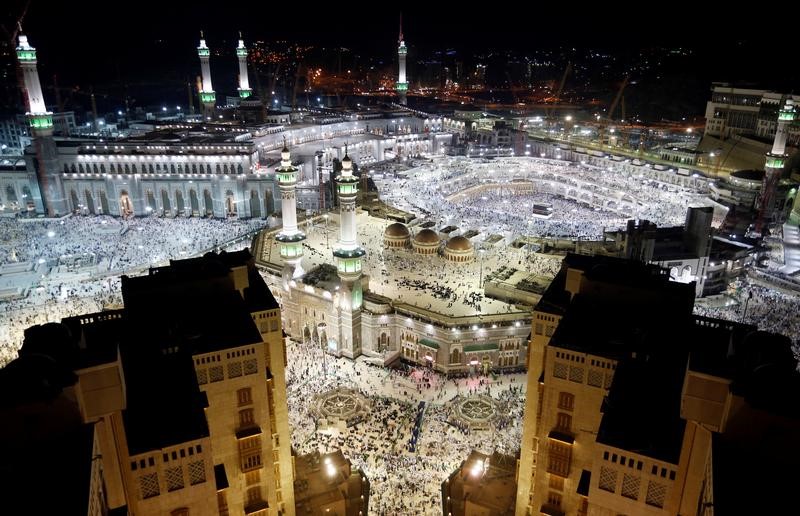By Tom Finn
DOHA (Reuters) - A row over access for Qataris to Islam's annual haj pilgrimage is further poisoning relations between their country and Saudi Arabia and aggravating a wider diplomatic rift with other Arab powers.
Qatar has accused Saudi Arabia, which hosts and supervises the haj, of deliberately making it hard for its pilgrims to obtain permits to go to Mecca. Saudi Arabia says Qatar is seeking to politicize the ritual for diplomatic gains.
A deal last week to let some Qataris cross the desert border into Saudi Arabia appeared initially to signal an easing of tensions, but subsequently led to even more acrimonious exchanges.
Many would-be Qatari pilgrims say they will not travel to the haj out of safety concerns, or because they fear becoming pawns in the political struggle.
"We are tired of this. Of course we want to go to Mecca but who should we listen to? Politics has broken down," said Ahmed al-Rumahi, 31, a student of Islamic studies at Qatar University.
For Saudi Arabia, custodian of Islam's holiest places, much is at stake. The kingdom ventures its reputation on organizing haj, a pillar of Islam which every able-bodied Muslim who can afford to is obliged to undertake at least once.
Qatari officials say that only a handful of Qataris are expected to attend this year's event, which runs from about Aug. 30 to Sept. 4, depending on sightings of the moon.
The haj dispute has added a new point of contention to the wider diplomatic standoff in the Gulf. In June, Saudi Arabia, Bahrain, Egypt and the United Arab Emirates (UAE) imposed sanctions on fellow U.S. ally Qatar and cut all transport links with the country, accusing it of supporting Iran and backing Islamist terrorism - charges Doha denies.
The dispute has defied mediation attempts by the United States and Kuwait.
'HATRED ON BOTH SIDES'
After last week's border crossing deal, which Riyadh said was brokered by a member of Qatar's ruling family, Saudi television showed dozens of Qataris driving across the frontier in white SUVs.
It then emerged that the dealmaker was Abdullah bin Ali al-Thani, a descendant of Qatar's founder, who was welcomed in Riyadh by Crown Prince Mohammed bin Salman and then by a holidaying King Salman in Morocco.
Qatari officials expressed suspicion at his role and the praise lavished on him by Saudi media, saying the sheikh, a businessman who lives overseas, was on a personal visit and did not hold a position in the government.
"The Saudis put him on a pedestal and we see this as an attempt to undermine our royal family," said a Qatari diplomat.
The boycotting countries deny seeking regime change in Doha, and Sheikh Abdullah denied acting out of personal interest.
Saudi officials say over 400 Qatari pilgrims have arrived through the land border, but Qatari media said most were Qataris crossing to tend farms they own in the kingdom. Up to 1,200 Qataris are eligible for the haj under an annual quota system.
Qatar has also criticized a Saudi offer to fly Qataris to the haj on Saudi Arabia Airlines, rather than allowing Qatari or other carriers to take them to Mecca.
The diplomatic rift has hurt businesses and separated families across the Gulf, and some conservative Qataris are angry that the infighting is preventing them from fulfilling religious duties.

Some Qataris fret about their safety in the kingdom, a concern Saudi authorities say has no justification. "There is hatred on both sides now, so yeah, I wouldn't feel comfortable showing my passport in hotels or other places in Saudi," said Mohammed, a civil engineer who declined to give his second name.